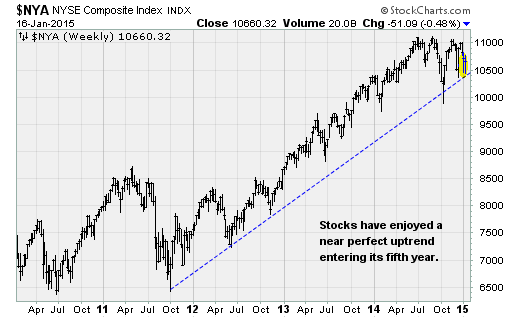5 reasons to worry about stocks
After the seemingly effortless investment gains of the last few years, 2015 is already shaping up to be a much more difficult year for stocks.
The swings have been severe, pushing up the CBOE Volatility Index (VIX) -- also known as Wall Street's "fear gauge" -- to its most consistent run above its 50-day moving average since 2011. Translation: Traders are fearful, and are willing to pay up for put-option protection against stock price declines.
The VIX is being pushed higher in a way that hasn't been seen since the market last had a meaningful correction. For stocks, the nervousness has kept a lid on the action. The NYSE Composite Index peaked back in July and has been in a turbulent, sideways trading range ever since as shown below. Over the last two weeks, stocks have repeatedly dropped to test their mid-December lows.
A test of the October lows looks likely with the market's breadth -- or the number of stocks in uptrends -- deteriorating at a rate not seen since that time. The risk now is that stocks break through those lows and suffer the first major correction in nearly four years -- a risk that looks poised to grow as a number of major catalysts play out.
With stocks looking wobbly, here are five things investors should keep an eye on:
Currencies. The foreign exchange market, probably the wildest and most chaotic area of the global financial system, was in focus last week after the Swiss National Bank unexpectedly removed its currency peg to the euro. The peg was created to halt the Swiss franc from rising during the eurozone crisis in a bid to protect Swiss exports. This involved the Swiss National Bank selling francs and accumulating euros, providing a steady bid of support beneath the euro.
Long story short, the peg was getting unwieldy. So they ended it.
The result was a breakout of volatility, with the euro collapsing and a number of currency brokerages coming under pressure as customers booked losses on the sudden move. A popular "carry trade" bet involved shorting or selling the Japanese yen against the euro -- known as the euro-yen carry trade -- and using the proceeds to buy European stocks and bonds.
On Thursday, when the SNB made their move, global markets were hit as these carry trades were forcibly unwound. (I discuss currency carry trades in another recent article here.)
Europe. With the euro sliding, attention turns to the European Central Bank policy decision on January 22 and the Greek elections on January 25. Expectations are high that the ECB will announce a large government bond purchase program -- a stimulus plan it has been hinting at since 2012. But policymakers are hamstrung by legal concerns (on fears purchases of Italian bonds could result in losses for German taxpayers, for instance) as well as political considerations. Greece is voting on whether or not to try to renegotiate the strict terms of its bailout and possibly secure some additional debt relief amid a stagnant economy and a 26 percent unemployment rate.
Any disappointment could deepen the euro's slide and keep pressure on markets.
Commodities. The nearly 60 percent drop in energy prices since the summer is well documented. But the weakness is now spreading to other industrial commodities, with copper falling more than 12 percent this week before recovering for a decline of 5.2 percent.
Not only is this raising concerns about Chinese financial deals that used industrial commodities like copper as collateral, but it's also calling into question the health of the global economy. The JPMorgan Global Manufacturing purchasing managers index, which measures factory activity, dropped in December to its lowest level since August 2013. Activity is declining outright on a month-over-month basis in China, Greece, Austria, Italy and France.
Earnings. The latest quarterly earnings season has gotten off to an inauspicious start with the realization dawning on investors that the combination of lower energy prices, weak retail sales and a slow creep in labor costs is about to pinch corporate profitability in a way that's typically seen at the start of recessions.
Financial results from bellwethers such as Alcoa (AA) and JPMorgan (JPM) were met with disappointment. According to Thomson Reuters data, analysts estimates of bottom-up S&P 500 earnings over the next 12 months has fallen into negative territory at a depth that accompanied the last three recessions. There have been other periods of small non-recession earnings contractions (such as 1998). But this is not good news.
Analysts at UBS note that the drop in earnings expectations has mirrored the pullback in oil prices, something that will come into focus as energy sector earnings start rolling out at the end of the month.
Interest rates. And finally, the last big concern has been the epic collapse in long-term government bond yields around the world.
For the U.S. 30-year yield, current levels have dropped below the lows set during the 2008 financial panic and in 2012, testing 2.4 percent last week. This is down from the post-recession high of 4.85 percent set in 2010 and a recent high of nearly 4 percent in late 2013. German and Japanese 10-year yields are at record lows. And the five-year yields of bonds issued by eurozone safe havens Finland, Germany, and Switzerland are in outright negative territory.
This is being driven by increased fears of deflation, or falling prices, as well as a recent stalling of economic data here at home as shown in this chart of the U.S. Citigroup Economic Surprise Index. Both augur badly for stocks over the medium-term.
At this point, investors would do well to reexamine their portfolio allocations, trim risk exposure where appropriate, and prepare for a wilder, less predictable trading in the months to come.

